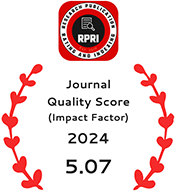Impact of Agriculture Projects Implemented by National NGOs on People Lives of Surobi District of Kabul Province in 2022
DOI:
https://doi.org/10.55544/jrasb.2.6.25Keywords:
Agriculture Projects, National NGOs, Sustainable Development, Market Access, Technical SupportAbstract
This research aimed to analyze the impacts of projects carried out by National NGOs in Surobi district, understanding the specific requirements of the people, and exploring ways in which humanitarian assistance can be effectively delivered through diverse NGO projects.
The study examined the impact of agriculture projects implemented by national NGOs on the lives of residents in the Surobi district of Kabul province in 2022. The research, based on primary data gathered through questionnaires distributed to respondents, focuses on how national NGOs empower farmers, enhance agricultural productivity, and improve overall welfare in the region. The analysis revealed that empowering agricultural communities through farmer groups, involving various stakeholders such as the Ministry of Agriculture, irrigation and livestock (MAIL), NGOs, and academia, was crucial for sustainable development.
However, challenges faced by farmers in Surobi district include transportation issues, limited market access, and lack of equipment and technical support, low literacy levels, increased labor burden, inadequate financial support, and poor coordination. To address these challenges, the study suggested that creating job opportunities, implementing agricultural schemes, and improving marketing opportunities through collaboration among institutions, government, private sectors, and NGOs.
The research indicated that while national NGOs distributed various resources such as cash, food, gardening supplies, livestock, seeds, and de-worming assistance in 2022, the impact on beneficiaries varied. Some respondents reported minimal impact on their lives, while others experienced significant positive changes.
Moreover, the study identified key issues such as high yearly consumption compared to income, limited employment opportunities, and challenges related to water availability for cultivation. It highlights the agricultural potential in the region, emphasizing the need for water management solutions, such as solar-powered water pumps for cultivating higher lands. To enhance the effectiveness of NGO interventions, the study recommends clear communication with local communities to prevent misunderstandings, and emphasizes the role of Kabul Department of agriculture, irrigation and livestock (DAIL) and Surobi DAIL as bridges between NGOs and the local population. Additionally, the study proposed inclusive project planning, involving people with disabilities, internally displaced persons (IDPs), returnees, and host communities, to ensure equitable distribution of benefits and sustainable development in the Surobi district.
Downloads
References
Bolton, L. (2019). Agriculture in Afghanistan: economic sustainability and sub-sector viability Retrieved from https://assets.publishing.service.gov.uk/media/5d10b7fbe5274a0694afe5f5/574___576__Agriculture_in_Afghanistan.pdf
FAO & World Bank. (2018). Rebuilding Resilient and Sustainable Agriculture in Somalia. Retrieved from http://www.fao.org/
ILO Office for Afghanistan. (2015). Afghan Competitiveness for Job Creation – Agricultural Value Chains. Summary Report. Retrieved from https://www.ilo.org/
Jamali, A., Lalzai, F., & Jamal, N. (2023). Marketing Constraints and Price Perspectives for Onion in Khost Province, Afghanistan. *Journal for Research in Applied Sciences and Biotechnology, 2*, 1-7.
Lalzai, F., Jamali, A., & Jamal, N. (2023). Storage Perceptions and Immediate Selling Problems of Onions by Farmers in Khost Province, Afghanistan. Journal of Emerging Technologies and Innovative Research (JETIR), 10(7).
Lalzai, F., Jamali, A., Mutaleb, A., & Jamal, N. (2023). Marketing Issues Faced by Potato Growers and Intermediaries in Parwan, Afghanistan. *Journal for Research in Applied Sciences and Biotechnology, 2*, 113-118.
Leao, I., Ahmed, M., & Kar, A. (2018). Jobs from Agriculture in Afghanistan. International Development in Focus. Washington, DC: World Bank. Retrieved from https://openknowledge.worldbank.org/
Muradi, A. J., & Rahmani, Z. (2020). Marketing Channel Efficiency of Almond Products: Evidence from Samangan and Balkh, Afghanistan Asian Journal of Agricultural Extension, Economics, and Sociology, 38(1), 169–179. https://doi.org/10.9734/ajaees/2020/v38i1130465
OCHA. (n.d.). Afghanistan: The alarming effects of climate change. Retrieved from https://www.unocha.org/
Poole, N., Sharma, R., Nemat, O. A., Trenchard, R., Scanlon, A., Davy, C., Ataei, N., Donovan, J., & Bentley, A. R. (2022). Sowing the wheat seeds of Afghanistan’s future, Plants, People, and Planet, 4(5), 423–4311. https://doi.org/10.1002/ppp3.10277
ReliefWeb. (2023). Afghanistan: Cold Wave Assessment on Livestock - Data in Emergencies Impact Report (July 2023). Retrieved from https://reliefweb.int/
Sharma, M., & Patil, C. (2018). Recent trends and advancements in agricultural research: An overview Journal of Pharmacognosy and Photochemistry, 7(2), 1906–1910.
Siddayya, Patil, C., Kishore, M. S., & Srikanth, H. S. (2016). The Effect of Climate Change on Food Security in India Indian Journal of Economics and Development, 12(4), 653-662.
Wikipedia. (n.d.). Surobi District, Kabul. Retrieved from https://en.wikipedia.org/wiki/Surobi_District,_Kabul
World Bank. (2014). Afghanistan - Agricultural sector review: revitalizing agriculture for economic growth, job creation, and food security. Retrieved from http://documents.worldbank.org/
World Bank. (2018). Afghanistan Resurrects its Largest Hydropower Plant Toward a Brighter Future. Retrieved from https://www.worldbank.org/
World Bank. (2018). Afghanistan: National Horticulture and Livestock Productivity Project Implementation Status and Results Report. Retrieved from http://documents.worldbank.org/
Downloads
Published
How to Cite
Issue
Section
License
Copyright (c) 2024 Muhammad Zahir Habibi

This work is licensed under a Creative Commons Attribution-NonCommercial-NoDerivatives 4.0 International License.


















